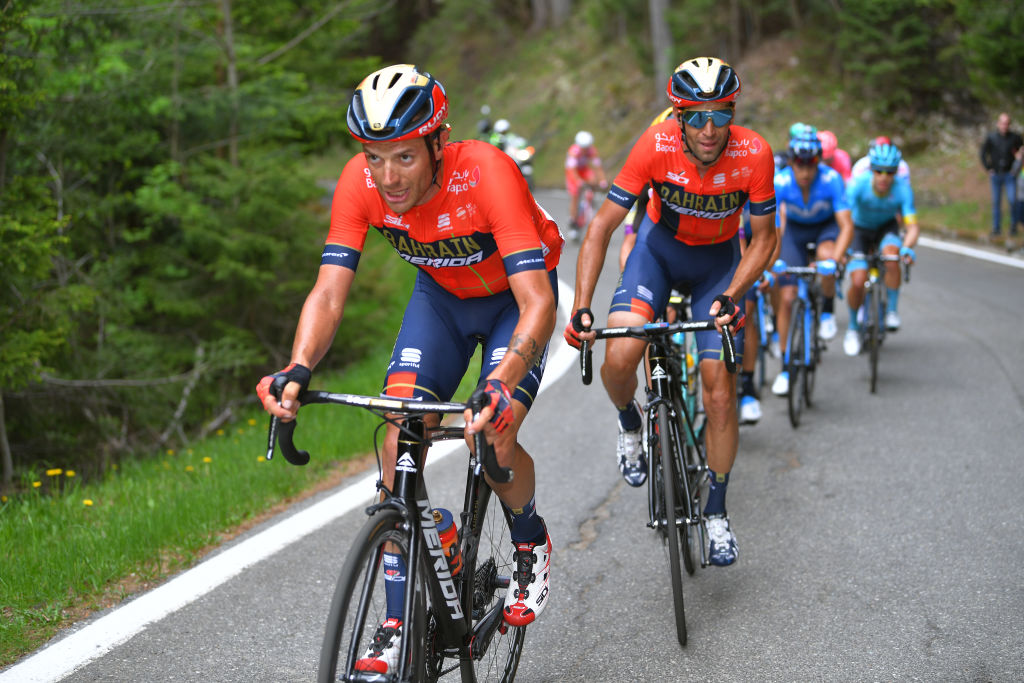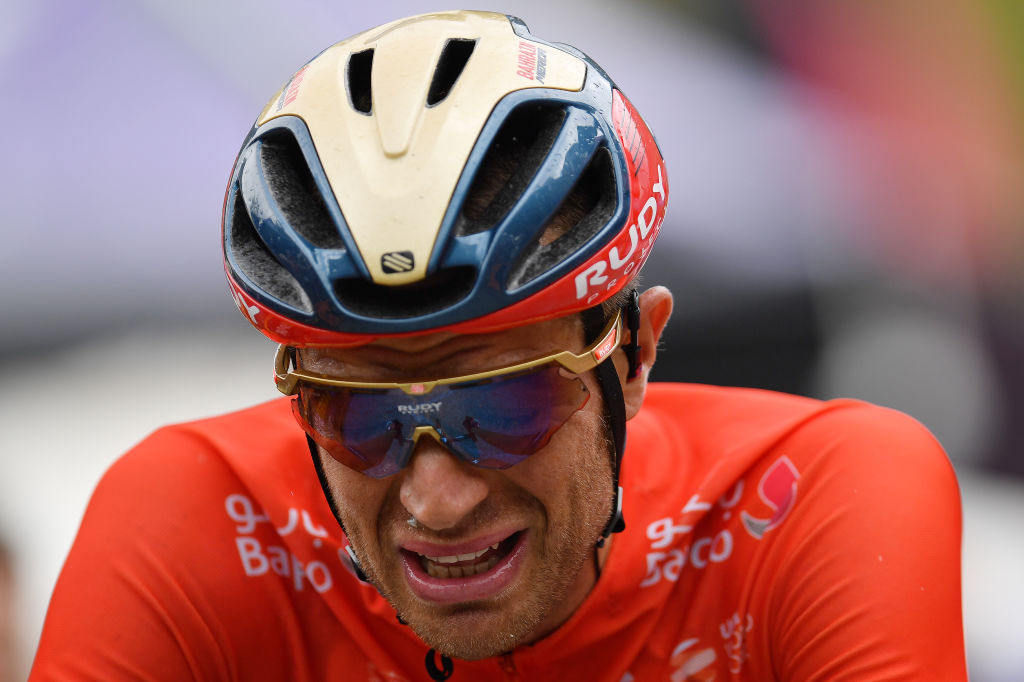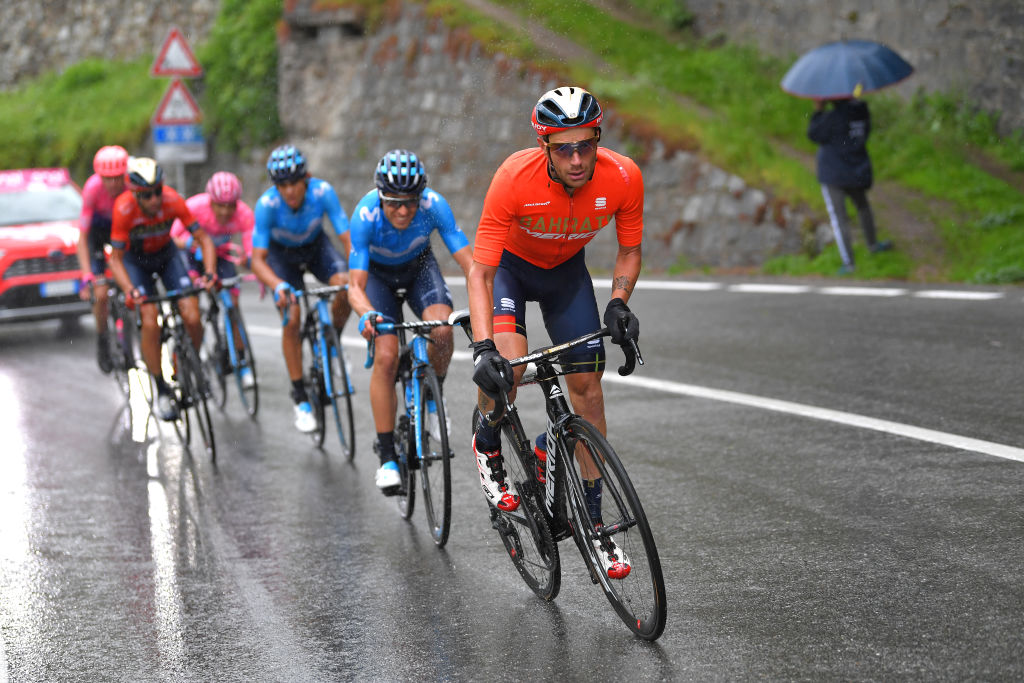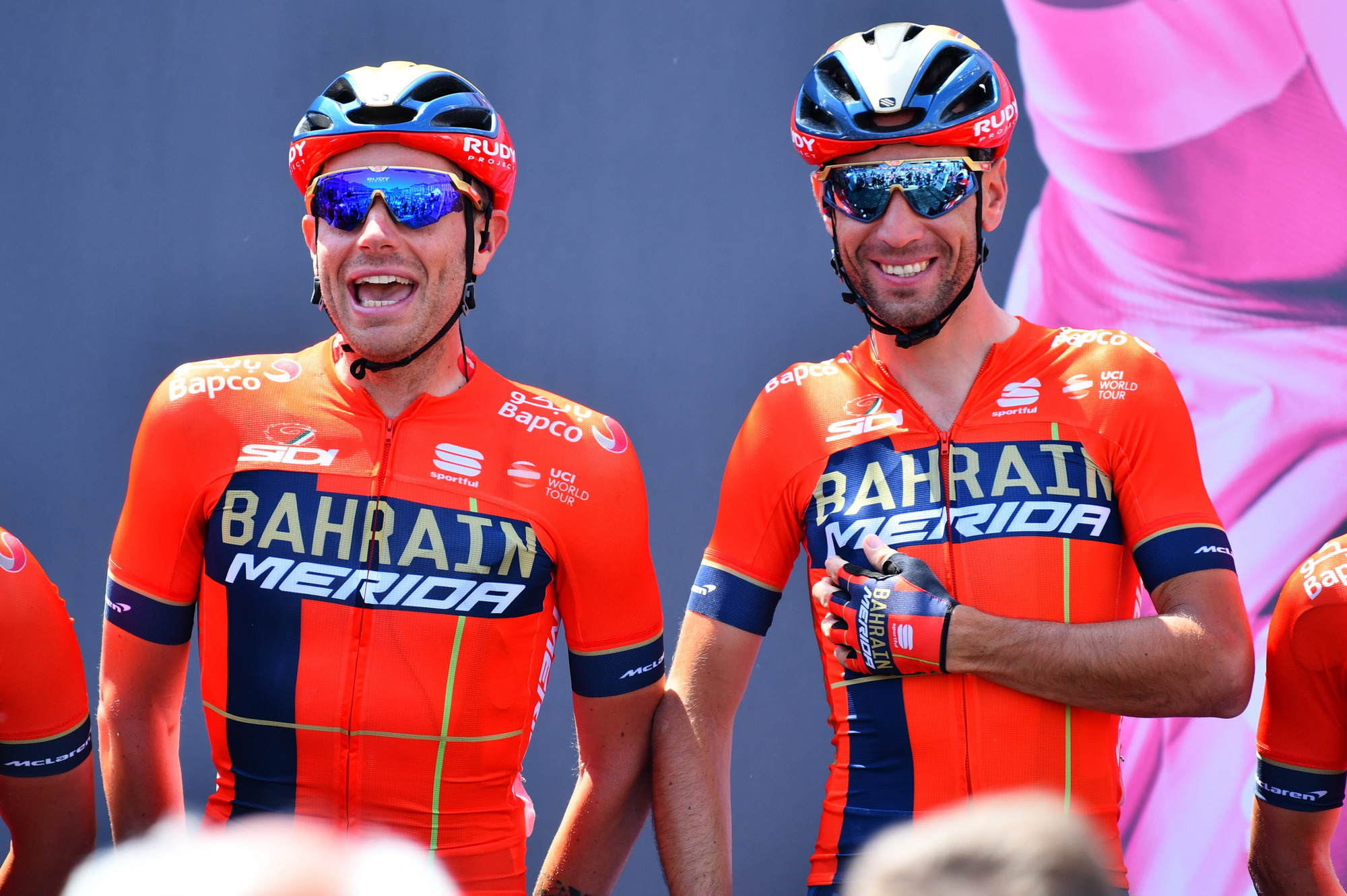Damiano Caruso: Cycling isn't only about winning and that's a story worth telling
Bahrain McLaren rider on Sicily and the gregario's life




Damiano Caruso was on a good day. He had sensed it before the start in Lovere and believed it when he made the early break on the Passo della Presolana. He knew it for certain when he was one of only three men left out in front come the upper reaches of the Mortirolo. The truism says that climbers don't suffer less, they merely suffer faster, and Caruso saw that he was making as much haste as anyone through this particular agony of double-digit gradients.
Despite the icy volleys of rain, the crowds were heavy, with merry tifosi waiting to the last second before draining to the roadside. Jan Hirt's accelerations had stung, and Giulio Ciccone was pedalling well, but Caruso had their measure. More than a decade into his professional career and a little over 30 kilometres from the finish, Caruso could dream of winning a stage of the Giro d'Italia, and yet he didn't dare.
Around 1,500 metres from the summit, his earpiece crackled into life with the simple instruction he had been half-dreading but wholly expecting all the way up the Mortirolo: "Wait." Caruso didn't dissent. He slackened his pace immediately and watched Hirt and Ciccone gradually vanish into the mist ahead of him.
As one race, and that impalpable dream of a Grand Tour stage win, faded from view, another sharpened into focus. Behind, Bahrain-Merida team leader Vincenzo Nibali had distanced Primoz Roglic and was now trying to shake off maglia rosa Richard Carapaz. Caruso was seconded to wait on the descent of the Mortirolo and ferry his leader as best he could to the finish in Ponte di Legno.
"I was certain that would happen, so I was already ready psychologically to do what I eventually did," Caruso tells Cyclingnews. "It's part of the job. That's what the agreement was. I'd have liked to have been able to try to win, but that wouldn't have been the right decision in that moment. I did my work, and that was satisfying, too."

A little under two minutes after Ciccone had sprinted to stage victory, Caruso freewheeled past the line in the anonymity of ninth place, having dragged the Nibali group along the interminable false flat to the finish. Behind the podium, Ciccone was readying himself to receive the winner's bouquet and all the plaudits. Caruso's recompense would come in the more modest form of his leader's gratitude for his sacrifice.
"When we got to the finish, Vincenzo thanked me on television, saying, 'Damiano did a great job,' so that meant the public was able to realise that you can do a beautiful race without winning," Caruso says. "It's easy to say bravo to the guy who wins, but the real fan understands that what I did was very difficult. Cycling isn't only about winning; that's a story worth telling, too."
The latest race content, interviews, features, reviews and expert buying guides, direct to your inbox!
Sicily
Five days earlier in Pinerolo, Caruso had another story worth telling, after placing second behind Cesare Benedetti in a three-up sprint on stage 12. Past the finish line, a journalist reminded him that it was the anniversary of the assassination of the anti-mafia magistrate Giovanni Falcone. The date, May 23, 1992, resonates with all Sicilians, but for Caruso, Falcone's story has a personal connection. Caruso's father, Salvatore, is a police officer, and as a young recruit in the 1980s, he occasionally formed part of Falcone's security escort in Palermo, before he transferred to Ragusa, in the south of the island, following his son's birth.
Caruso acknowledges freely that some of the newspaper headlines following his second-place finish invoked a little poetic licence – "They reminded me after the stage that it was Falcone's anniversary, so, to be honest, I didn't set out that morning with a desire to win for that specific reason," he explains – but he was glad of an opportunity to pay a public tribute to Falcone's efforts to combat the mafia and the less heralded roles played by men like his father in that tumultuous period.
"My father was never one of the permanent members of Falcone's escort, but they would send young officers along with them to gain experience, and he was among them," Caruso says. "My father was, in his own small way, a participant in this history, which he was able to tell me about when I was old enough to understand. Now, as an adult, I can understand the sacrifices made by people like Falcone and Paolo Borsellino [Falcone's fellow magistrate, assassinated by the mafia just two months later – ed.], and by all the members of law enforcement who guarded them. That's something very important."
Those murders in the summer of 1992 marked a watershed in Sicilian history. Cosa Nostra may still exist, but its grip on everyday life has loosened considerably in the quarter of a century since, with defiance of the old ways visible in everything from the Addiopizzo movement, which encourages shop owners to defy extortion attempts, to the naming of Palermo's airport in honour of Falcone and Borsellino.
"That stereotypical, mafioso image of Sicily doesn't exist anymore. The mafia still exists, but before it was much more evident. Now Sicily is a normal place, like everywhere else," says Caruso, who has made a point of living on the island throughout his professional career.
"I decided to keep living there because it's the place where I want to live, with all its advantages and its defects. I like to think that when there's a problem, you shouldn't leave, you should stay and try to resolve it. If we all left, the problem wouldn't be resolved. But if all the young people stayed, with our different mentality we'd manage to change the old system."
As a teenager, Caruso had been compelled to move to Tuscany in order to follow his ambitions and find racing commensurate with his ability, but on turning professional with LPR in 2009, he moved back to Ragusa, where he lives with his wife Ornella and their two children. It means every journey abroad includes an additional stopover in Rome before flying on to Catania – an inconvenience worth enduring.
"It was something of a bet with myself, too, because it wasn't a given that I'd be able to do it," he says. "But now I've been a pro for 10 years, and I've been doing it from Sicily all that time, so I'd say it's worked out."
Ragusa is hardly a cycling heartland, but perhaps therein lies a part of the attraction: it keeps a man grounded. When Caruso rode the World Championships in Innsbruck last year, for instance, a friend from home called on the Sunday to ask when it finished, assuming that the squadra azzurra still had quarter-finals and semi-finals to play, as though it were like football's World Cup. Moving to Monaco or Switzerland has occasionally been a vague temptation, but never a realistic option.
"I've thought about it, but I've either not had the desire or the courage to do it, and, in the end, I don't think it's worth the effort," Caruso says. "OK, money is important, our careers aren't infinite, and so on. But it's always nice to come home."
Gregario
In the winter of 2011, Caruso had cause to fear that he would be back in Sicily more permanently, when the Italian Olympic Committee [CONI] requested a four-year ban for what it described as "complicity in the attempted acquisition of banned substances". The infraction dated back to Caruso's time as an amateur, when, at a 2007 training camp on the Stelvio, a fellow rider asked to be put in contact with a soigneur known for his doping links.
"My error was that I should have just said no. Instead, because I didn't want to say no, I said, 'Maybe – we'll see,' in a throwaway way," Caruso says.
That conversation came to the attention of CONI during their investigation of former Liquigas rider Gianni Da Ros, who was handed a 20-year ban (later reduced to four) for trafficking doping substances, and Caruso was summoned to Rome to give evidence.
"I went to Rome without a lawyer or anything because I was certain I hadn't done anything wrong. Instead, 10 months later, they told me I had incriminated myself with the statement I gave them," he says. "They said, 'You should have told us at the time that they were looking to get in contact with this guy.' In the end, [CONI argued that] it was as though I had collaborated with them."
In February 2012, CONI announced that Caruso had been handed a backdated, one-year suspension, as well as a €500 fine. It meant that he could continue his career uninterrupted, although he considered appealing to the Court of Arbitration for Sport to have the blemish excised from his record altogether.
"I didn't earn enough to pay for that," he says now. "Only people who have the money can get justice for themselves. It shouldn't be like that, but it is."
By then, Caruso had moved up to WorldTour level at Liquigas, where his fellow Sicilian and Mastromarco product Nibali was already established as the coming man of Italian stage racing. Caruso, a strong climber and Italian under-23 champion in 2008, was touted as a talent on turning professional, but he quickly settled into the role of a deluxe domestique.
His solitary victory in the paid ranks came on a stage of the Settimana Coppi e Bartali in 2013, and although he has placed in the top 10 at the Giro and the Vuelta a España, and 11th at the 2017 Tour de France, in his time, his calling card has been his work on behalf of various leaders: Nibali and Ivan Basso at Liquigas, Tejay van Garderen and Richie Porte at BMC, then Nibali again at Bahrain-Merida.

The vocation of the gregario is one that calls quietly but persistently. There was no one Damascene moment when Caruso decided to dedicate his career to supporting others, but rather a gradual realisation that this was his place in cycling's cosmos.
"Perhaps I never really wanted it myself, and, over time, I didn't really believe in my own abilities. Maybe that made me lose the instinct of winning," he says. "But it's also true that I've always been on strong teams with big leaders. When I was with Liquigas, there was Basso, Vincenzo and Peter Sagan. I went to BMC, and there was Richie Porte and Tejay van Garderen. That might have been the moment where I could have done a bit more if they'd given me the possibility."
Indeed, Caruso's best Grand Tour finish came in his first year at BMC, when he was handed a free role at the Giro and finished eighth in Milan.
"I didn't even know how to prepare for a Giro, so it was all improvised. Looking back, maybe if I had somebody who really explained to me how to do it, then I might have done a bit more," says Caruso, although he praises BMC as "the most organised and complete team I've been on".
He has had other moments of relative liberty in his career, notably when Porte crashed out in the opening week of successive Tours de France, but having watched at close quarters over the past decade as riders struggled with the burden of leadership, Caruso is content with his own position.
"I've seen guys in their careers who've taken on a lot of responsibility and then haven't been able to live up to it, and they've suffered because of it. I don't want to be like them."
On joining Bahrain-Merida in 2019, Caruso knew he was linking up with a leader whose status brooked no argument. He may have come close to individual glory on the Giro, but the success or failure of his race was only ever going to be judged on how well he rode in his friend Nibali's service.
"With the condition I had at the Giro, I could easily have finished in the top 10, but winning a Grand Tour isn't within my capabilities, so it's only right to put yourself at the service of someone who can," Caruso says. "Besides, my work is always recognised by the team, and it's not like I do it for free. My work is rewarded in some way."
Not only champions
Nibali's departure for Trek-Segafredo means that Caruso might on occasion enjoy a different role at the rebranded Bahrain McLaren in 2020, and the 32-year-old admits that his ambition is to land a stage win at a Grand Tour before he hangs up his wheels – although he is equally mindful that harpooning that particular White Whale will do little to alter the overall tenor of his career.
"I know that if I retire with five wins or with one win, it doesn't change anything for the statistics," Caruso says. "All that changes is my own personal satisfaction, so I want to do it for myself, and not for anyone else."

Yet Caruso almost recoils from the idea of distractedly listing off objectives and race programmes in an interview. Over the course of his career, as more and more of the Italian sporting media's resources have been diverted to football, and as the move from print to digital has placed a premium on stars who draw web traffic, cycling coverage has focused on an ever-narrowing cadre of elite riders, to the detriment of the human-interest stories that make up the pyramid beneath them.
"It's almost always the same banal questions with the riders who win: 'What will your programme be? What sensations did you have in the race? What do you expect from the race on Thursday?'
'What do I expect? Well, I expect to do a nice race; I'd like to win,'" Caruso deadpans. "And the person who reads the article sees it and thinks, 'Ah, it's just a normal interview.'
"But cycling isn't only made up of champions. There are lots of other stories. There are the sacrifices of the domestiques, the mechanics, the soigneurs. There needs to be more attention spread around because that way you talk about things other than cycling."
In other words, all the things we really talk about when we talk about cycling.

Barry Ryan was Head of Features at Cyclingnews. He has covered professional cycling since 2010, reporting from the Tour de France, Giro d’Italia and events from Argentina to Japan. His writing has appeared in The Independent, Procycling and Cycling Plus. He is the author of The Ascent: Sean Kelly, Stephen Roche and the Rise of Irish Cycling’s Golden Generation, published by Gill Books.